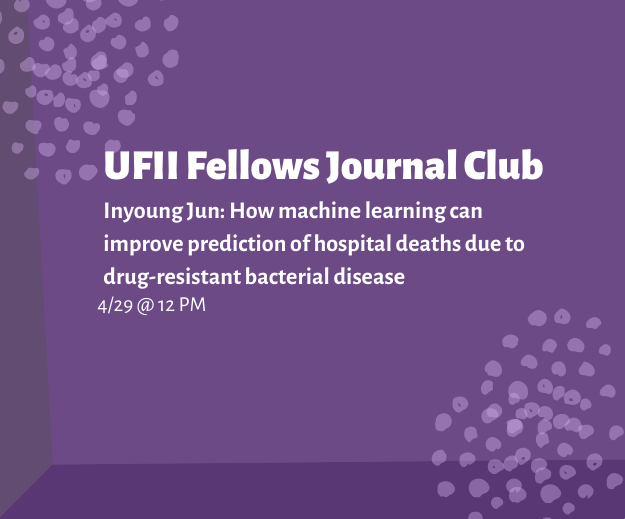UFII Fellows Journal Club Virtual Seminar – Inyoung Jun

- This event has passed.
UFII Fellows Journal Club Virtual Seminar – Inyoung Jun
April 29, 2021 @ 12:00 pm - 1:00 pm

UFII Fellows Journal Club Virtual Seminar Series
“How machine learning can improve prediction of hospital deaths due to drug-resistant bacterial disease: an application focus on Klebsiella pneumoniae bloodstream infections”
by Inyoung Jun
Graduate student in the Department of Epidemiology
Thursday, April 29, 2021
ABSTRACT:
Drug-resistant bacterial infections are a global public health concern due to high mortality and limited treatment options. To date, a number of clinical scores that assess disease severity and risk of death are available, such as the quick Pitt bacteremia score (qPitt), but their predictive performance is moderate.
In this work, we sought to leverage electronic health records (EHRs) and machine learning to predict bacteremia mortality for people with bloodstream infection by Klebsiella pneumoniae (BSI-KP), using the University of Florida’s Integrated Data Repository (IDR), with the objective to improve over current risk scores. We extracted BSI-KP events between 2011 and 2018 where an antibiogram (drug resistance) test was available, and collated patients’ demographics, clinical diagnoses, medications, and laboratory tests. We tested the predictive performance of the qPitt score, and then, using qPitt + new EHR variables, we fit boosted/LASSO logistic regression, decision trees, and random forests. We executed multiple train/test splits and compared methods via area under the receiver operating characteristic (AUROC), sensitivity and specificity. The qPitt score showed moderate discriminative ability (AUROC=0.57), whilst the machine learning models significantly improved its performance (Boosted logistic regression AUROC=0.70, LASSO AUROC=0.69, decision tree AUROC=0.61, and random forest AUROC=0.68). Similar results were obtained in a subpopulation analysis of patients admitted to the intensive care unit.
In conclusion, machine learning methods in conjunction with integrated EHR data can improve current risk scores for bacteremia severity and mortality, and be considered for effective deployment in clinical decision-making.
Bio:
Inyoung Jun, graduate student in the Department of Epidemiology, studies optimizing antibiotics treatment using data science. Her research interests lie in finding practical answers for real world public health problems including antimicrobial resistance and community-acquired infections. She received her master’s degree in Statistics from Korea University and bachelor degree in Economics and Business from Sogang University.


